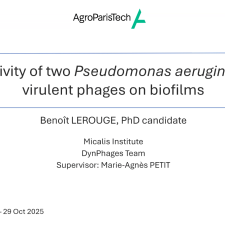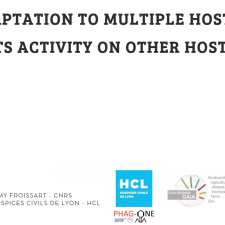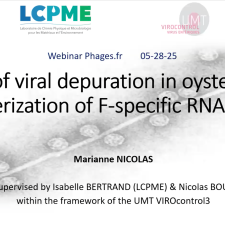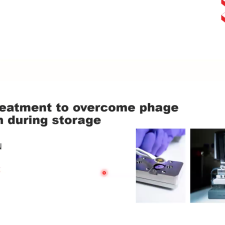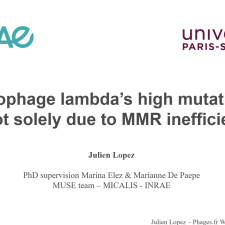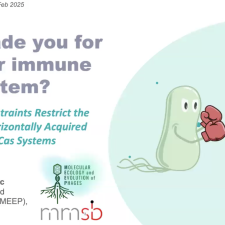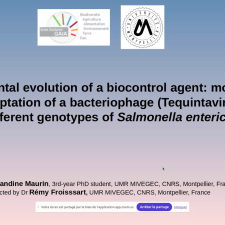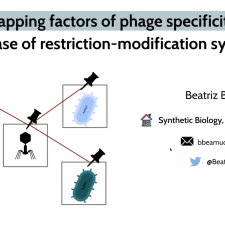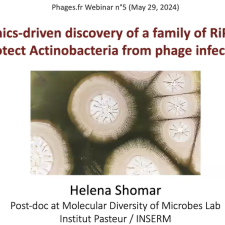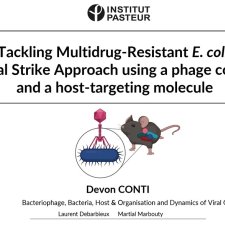Webinar
Description
Les webinaires sont organisés par le réseau "Phages.fr" pour donner l'opportunité aux membres du réseau (priorité donnée aux chercheurs en début de carrière) de dévoiler leurs derniers résultats ! Il ne s'agit pas seulement de présentations ; il s'agit de créer une "zone amicale" où vous pouvez partager et recevoir des commentaires constructifs. Ces webinaires sont l'occasion d'échanger au sein du réseau Phages.fr, d'avoir une meilleure visibilité des projets en cours dans les laboratoires et de permettre aux membres participants d'identifier des collaborateurs potentiels et de futurs partenaires qu'ils pourront contacter si nécessaire. Rejoignez-nous en visio pour une session de 45 minutes, avec un exposé de 20-30 minutes suivi de 15-20 minutes de discussion en anglais, en directs les derniers mercredis du mois (à 13:30) et enregistrés sur notre chaine Phages.fr sur Canal-u.tv/phages
The webinars are organised by the "Phages.fr" network to give members of the network (priority given to early-career researchers) the opportunity to unveil their latest results! It's not just about presentations; it's about creating a "friendly zone" where you can share and receive constructive feedback. These webinars are an opportunity to exchange ideas within the Phages.fr network, to get a better overview of current projects in the laboratories and to enable participating members to identify potential collaborators and future partners whom they can contact if necessary. Join us on video for a 45-minute session, with a 20-30 minute presentation followed by 15-20 minutes of discussion in English, live on the last Wednesdays of the month (at 13:30) and recorded on our Phages.fr channel on Canal-U.tv/phages.
Cours
Activity of two Pseudomonas aeruginosa virulent phages on biofilms
Pseudomonas aeruginosa, a Gram-negative bacterium, causes infections that are difficult to treat due to biofilm formation and antibiotic resistance. This study investigated the efficacy of two phages,
Directed Evolution of a Tequatrovirus Bacteriophage Expands Host Range Against Carbapenem-Resistant…
This work explores whether evolving phages on diverse bacteria make them universally effective. Directed evolution of a Tequatrovirus phage on a genetically diverse bacterial population of E. coli
Study of viral depuration in oysters and characterization of F-specific RNA phages
Enteric viruses like noroviruses commonly contaminate shellfish and cause gastroenteritis. Due to the absence of a routine culture method for noroviruses, F-specific RNA bacteriophages (FRNAPH) are
Surface treatment to overcome phage adsorption during storage
Our study focuses on developing vials with antibiofouling coatings to prevent bacteriophage adsorption. PEG-like and zwitterion compounds are explored as promising films on glass and silicon
Bacteriophage lambda’s high mutation rate is not solely due to MMR inefficiency
This study re-evaluated the mutation rate of phage lambda and its host, E. coli. It confirmed lambda's higher mutation rate but found that mismatch repair (MMR) inefficiency due to Dam methylation
Ecological Constraints Restrict the Benefits of Horizontally Acquired CRISPR-Cas Systems
This study explores the horizontal transfer of a type I-F CRISPR-Cas system from Pseudomonas aeruginosa to Pseudomonas fluorescens. While functional in the new host, its protective benefits depend on
Role of trehalose polyphleates in the interactions between therapeutic phages and Mycobacterium abs…
Mycobacterium abscessus is a multidrug-resistant bacterium causing severe infections in cystic fibrosis patients, where phage therapy shows promise as an alternative treatment. Testing phages on
Experimental evolution of a biocontrol agent: monitoring the adaptation of a bacteriophage (Tequint…
Evolution of a virulent Tequintavirus leads to an expansion in its host range and increases its virulence against resistant Salmonella enterica strains. Key mutations, particularly in the Long Tail
Rationalisation of the purification, formulation and packaging of anti-Staphylococcus aureus therap…
Preparing and preserving therapeutic phage suspensions is crucial for advancing phage therapy. By optimizing purification and formulation processes, this approach enhances phage shelf-life and
Mapping factors of phage specificity: the case of restriction-modification systems
Phages must bypass various bacterial defenses, including restriction-modification (RM) systems, which degrade foreign DNA with specific motifs. We propose a novel method using random sequences
Genomics-driven discovery of a family of RiPPs that protect Actinobacteria from phage infection
Bacteria produce numerous natural products to adapt to changing environments, but most of their functions are unknown. Genomic and synthetic biology studies reveal that some of these compounds,
Tackling Multidrug-Resistant E. coli: A Dual Strike Approach using a phage cocktail and a host-targ…
Description of a novel approach to combat multidrug-resistant E. coli ST131 by combining a cocktail of bacteriophages with the C910 compound, which inhibits host cell invasion. This strategy
Intervenants
Doctorant en microbiologie dans l'unité MICALIS de l'INRAE
Auteur d'une thèse de doctorat en sciences de la vie et de la santé spécialité microbiologie à l'université de Tours en 2023
PhD Student - MuSE Team, Micalis institute, INRAE, Jouy-en-Josas.
Postdoctoral researcher - Molecular Ecology and Evolution of Phages group, MMSB institute, Lyon
Postdoctoral researcher - Infectious Disease Research Institute in Montpellier
Titulaire d'une thèse d'exercice en Pharmacie (Lyon 1, 2021)
Postdoctoral researcher - Synthetic Biology Unit, Institut Pasteur, Paris
Post-doctorante au laboratoire Molecular Diversity of Microbes, Institut Pasteur (en 2024)
Auteur d'une thèse en Microbiologie et immunologie à Sorbonne Université en 2025

